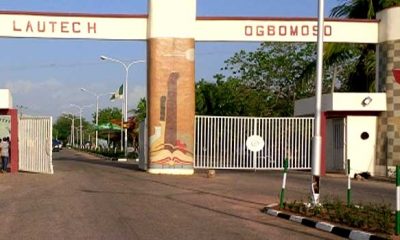Education
Despite Varsity Closure, LAUTECH Set To Lead Nigeria In Nanotechnology

By Faith Okerinmodun
A group in Ladoke Akintola University of Technology, (LAUTECH) known as NANOtechnology research group has said despite the school’s closure, the university is set to become one of the best in NANOtechnology through the research group.
The head of the nanotechnology research group, Agbaje Lateef, a Professor of Microbiology in the Department of Pure and Applied Biology of the University said this during an interview with our reporter.
He explained that the group consists of dedicated young scholars who have been trained or shown keen interests in this emerging discipline.
He said members are propelled by quest to conduct meaningful research, and also to train manpower in nanotechnology, thereby putting LAUTECH in a vantage position in Nanotechnology Research in Nigeria.
Prof. Agbaje Lateef also revealed that the group is set to organize a national workshop on the synthesis, characterization and applications of nanoparticles on 21-24 August, 2017.
According to him, “The nanotechnology research group (NANO+) at Ladoke Akintola University of Technology, Ogbomoso, Nigeria, which was formed on September 4, 2014 to advance the course of research in the multidisciplinary subject of nanotechnology, that is at low ebb in the country, is set to organize a national workshop on the synthesis, characterization and applications of nanoparticles on 21-24 August, 2017.
“The body deals in designs, synthesis and manipulation of Particles or structures.
“Nanotechnology deals with design, synthesis and manipulation of particles or structures within the range of 1-100 nm (1 nm equals 10-9m).
“To put in perspective, a typical human hair of about 100 µm wide is equivalent to 100,000 particles, each of 1 nm wide, while human blood cells range between 2,000 to 5,000 nm long.
“This small size gives nanomaterials the remarkable properties they possess, which is largely attributed to high surface area to volume ratio. While nanostructures have been in existence from the time immemorial; scientists recently began to understand their behaviours.
“The nanotechnologists are now using this knowledge to control their properties, and creating arrays of functional materials for subsequent applications in diverse areas of agriculture, medicine, science and engineering.
“Examples of nanomaterials are nanoparticles or nanocrystals made of metals, semiconductors, or oxides as well as those of inorganic materials such as quantum dots, nanowires and nanorods or nano-carbon materials such as graphene, carbon nanotube among others.
“Remarkable growth in this evolving technology has unlocked innovative, fundamental and applied leading edge research, ranging from the synthesis of nanoscale materials, utilization of their exotic physicochemical and optoelectronic properties.”
Prof. Agbaje said the group has a vision of transforming LAUTECH to a centre of excellence in Nanoscience and Nanotechnology in Nigeria.
His words, “Members have vast training in molecular biology, industrial microbiology, biotechnology, nanotechnology, toxicology, biochemistry, materials engineering, renewable energy and nanofabrication, which they deploy in nanotechnology research.
“At the moment, the group has delved into investigations involving silver, gold and silver-gold alloy nanoparticles through green synthesis by using novel bacteria, plant and unconventional materials from Nigeria, with potent antimicrobial, larvicidal, antioxidant, dye-degradation, desulphurization, anticoagulant, and thrombolytic (dissolution of blood clots) activities.
“LAUTECH research group has also published 21 quality researches with quality research outcomes in Journals.
“This has led to the publication of twenty-one (21) quality research outcomes in reputable Journals with renowned publishing outfits such as SPRINGER, ELSEVIER, DE GRUYTER and IEEE. Several studies focusing on renewable energy, plant nutrition, preservation of materials, luminescence, toxicology, additives in paints, obesity among others are being investigated by members of the group.
“The group has robust collaboration with scholars from University of KwaZulu-Natal, Pietermaritzburg, South Africa, and King Fahd University of Petroleum and Minerals, Saudi Arabia. The group aimed at contributing to the growth of the University through Research and Training, while it is poised for collaborative research involving individuals, groups, institutions and industries.”
“In furtherance of its cardinal objectives, the group invites research scientists, technocrats, policy makers and exhibitors to her maiden ‘Workshop on the synthesis, characterization and applications of nanoparticles’, scheduled for 21-24 August, 2017.
“It is a workshop that targets broad audience with background in agriculture, life sciences, physical sciences, environmental sciences, engineering and medical fields. The workshop is ladened with striking lectures, hands-on practicals as well as networking and collaborative discussions.
“The workshop is a golden opportunity to catch the train of nanotechnology, as participants would learn where and how nanotechnology can be incorporated in to their research activities. Further details can be obtained online at: www.nanotech.lautech.edu.ng.” He added.
-

 News4 days ago
News4 days agoCapacity Building: OHIS Organizes Retreat For New Board Members
-

 News3 days ago
News3 days agoFamily Of Gruesomely Murdered Pastor Cries For Justice
-

 News5 days ago
News5 days agoOsun RAAMP Opens Bid For Road Constructions Statewide
-

 News2 days ago
News2 days agoJust In: Nigerian Governor Dethrones 15 Traditional Rulers, Reinstates 7











